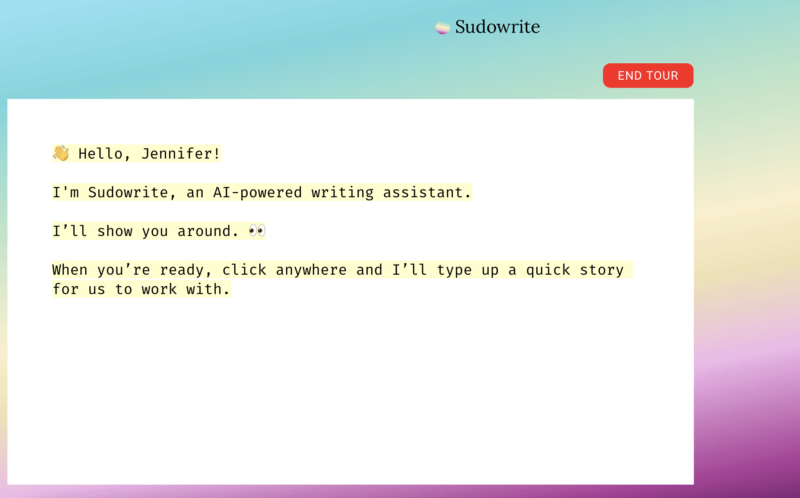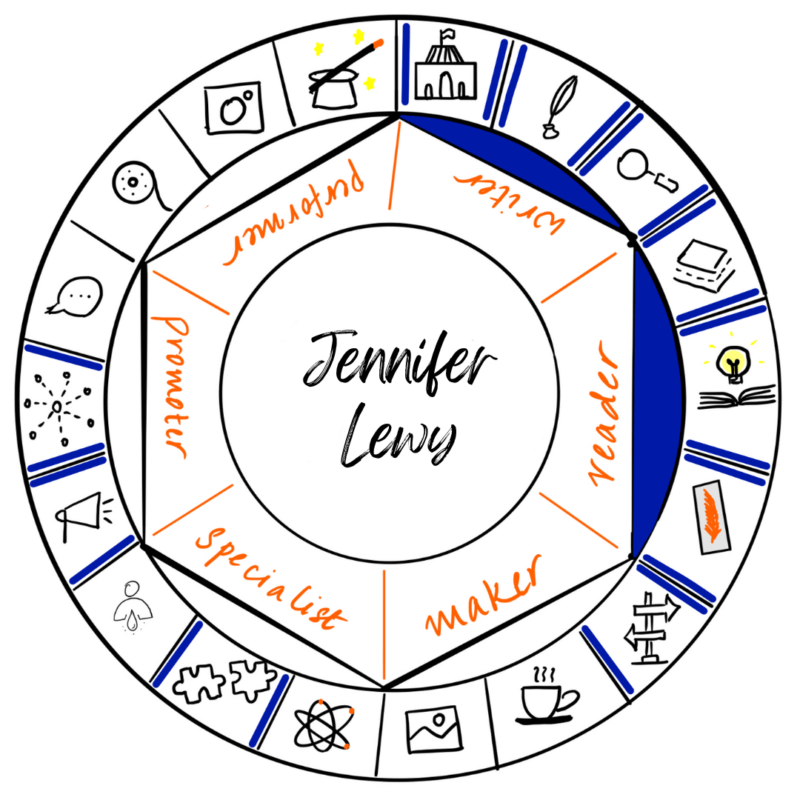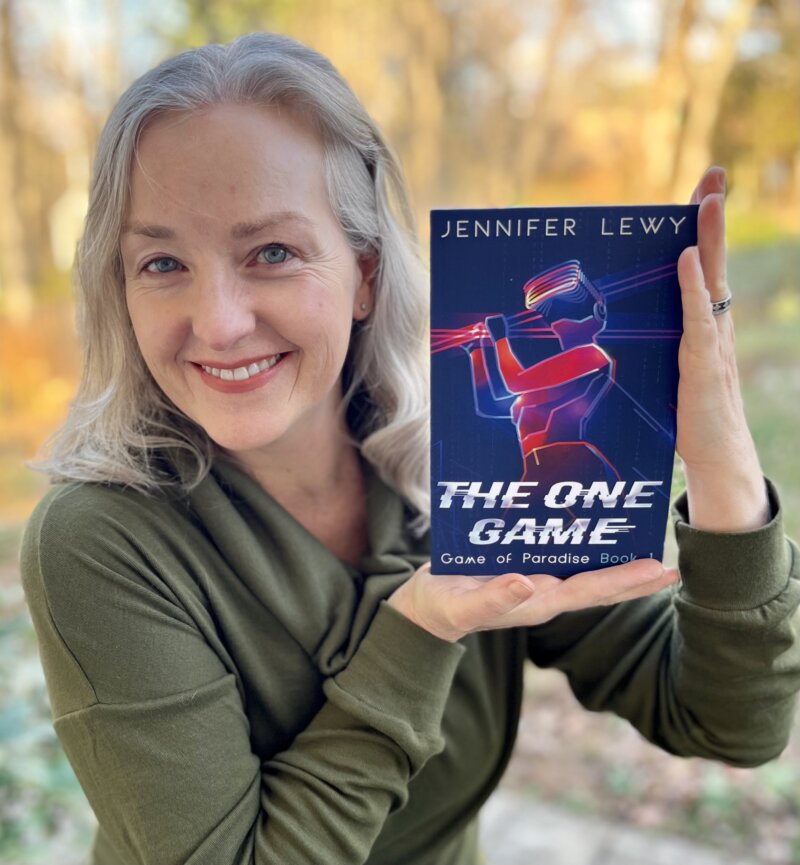Happy Friday, friend! Today, I am excited to host author Jennifer Lewy to share her adventures in writing with Artificial Intelligence (AI)! In his latest book, Jay Ingram had whole chapters decided to the future of AI and that is what I was reading when Jen told me she has worked with AI for some years now. I had to know more and it is a pleasure to bring this guest post to you.
Before we begin. the author has no affiliations with any of the tools mentioned in this article. All references are provided purely for informational purposes and represent the author’s personal experiences.
On the Unexpected Role of Artificial Intelligence in Publishing
A guest post by Jennifer Lewy
The revolution begins
I first heard about Sudowrite on a 2021 episode of The Creative Penn podcast. I felt a distinct flutter of excitement. Software to help brainstorm and create stories? Intriguing.
I signed up for the beta version of this revolutionary software in the late summer of 2021, and within days had enough jaw-dropping interactions to realize it could be the key to finally finishing my novel.

By the time the winter holidays rolled around four months later, I had written “The End” on my first book, thanks in part to the first-ever AI writing program, well before GPT-3 and other AI writing tools became mainstream.
The joy of co-creating with AI
In its early iterations, Sudowrite made me crack up with its quirky output. Useful? Not always, but it kept my momentum going. I could ask it to autocomplete a sentence or brainstorm plot twists. It gave me song lyrics, character names, and detailed sensory descriptions of imaginary settings.
Did AI write my first novel? Ha ha, no. I conceived of the premise, I outlined the plot, I created and named the characters. I came up with their core conflicts and emotional wounds, how the story would begin and end. I wrote each and every scene.
But here’s how AI came into play: when I opened the manuscript, I would start typing where I left off, and then…. hm. Should this character leave the room or sit down to think? Should the dialogue take us into the next plot beat or should there be a flashback?
The second-by-second decisions were often roadblocks for me, and before Sudowrite, my mind would screech to a halt and fumble for a solution. With Sudowrite, all I had to do was paste in the paragraph or scene I was writing, hit “Write” and Sudowrite would take its best guess as to what happened next.
Don’t get me wrong—I rarely copied what it gave me. But its suggestions often sparked ideas or took my thoughts in a direction I hadn’t anticipated. It was like having a writing partner who was available 24/7, always ready to throw out ideas and help me brainstorm. I could ignore its suggestions, change them, or use them as a springboard without worrying about hurting anyone’s feelings.
Global anxiety strikes
When “The One Game” hit the shelves in November 2022, AI writing tools were still an obscure concept. But just a few weeks later, ChatGPT exploded into the mainstream. A slew of other AI writing tools followed closely thereafter.
All of a sudden, AI-assisted writing was a thing. Emotions got big. Would AI replace authors and creators? Would it take over the world and make humans irrelevant (or worse)? The fear was palpable. I had the fear, too.
I am closely following the legal and ethical discussions surrounding the use of AI in creative fields. It’s an exciting and challenging frontier, and will have wide-ranging implications for the training of large language models, copyright law, and how artists receive compensation for their work.
Here’s what worries me
I believe the most pressing question facing us is who controls the development of AI. Specifically, will we allow AI to benefit all living things on this planet—or not?
What worries me most is a future where AI is controlled by a select few, leading to a significant imbalance of power. This could result in the misuse of AI for personal gain, and the potential suppression of diverse perspectives and voices. In that scenario, AI could be used to divide us, rather than unite us. To manipulate, rather than enlighten. To entrench inequality, rather than to foster acceptance.
So how can we use AI to create a future where humans are more connected, more creative, and more empathetic? How can AI help us envision and build a world that is more abundant, diverse, and inclusive?
There’s no straightforward answer, but I believe it starts with open dialogue and collaboration. We need to involve a broad spectrum of voices in the conversation about AI’s future.
As an author, I am excited about the potential of AI to help craft more compelling narratives, to explore new themes and ideas, and to push my own boundaries in storytelling. I am equally excited about the potential of AI to democratize the creative process, to make writing and other forms of creative expression more accessible to people who might not have had the opportunity otherwise.
Expanding the Artificial Intelligence toolkit
I’m now finishing my second novel, and once again, using Sudowrite. I’ve expanded my AI toolkit to include:
- ProWritingAid, a grammar and style checker
- Lex.page, a free AI-assisted drafting and editing program
- Pi, a free personal AI chat app
- ChatGPT, the free version for now
- Marketing Magic, AI-powered software to help with marketing writing
Does AI write my content? Still no. It assists me in fleshing out ideas, focuses my writing time, and ensures a polished final product. It’s like having a team of virtual writing partners, each with their own unique strengths, ready to assist at any moment.
A collaborative future
One thing I know for sure is that AI has been a game changer for me.
It’s given me freedom to explore different paths in my stories, to break free from the constraints of my own mind, and to experience my characters and their world in a new light.
I choose to use AI to help me tell stories that connect us, that challenge us, that make us think and feel and grow. Because in the end, that’s what storytelling is all about.
About the Author

Jennifer Lewy writes about the connection between humans, our planet, and unseen worlds. She worked as a medical assistant, social worker, and voiceover artist before opening her own freelance healthcare writing business in 2005.
The idea for her young adult science fiction series grabbed her during the 2020 pandemic. The One Game, A YA Sci-Fi Adventure is her first novel. Jennifer was born in the Northeast Kingdom of Vermont, grew up in the outskirts of New York City, and lives near Boston, Massachusetts with two teens, two cats, and her husband. She enjoys taking hikes all over New England to soak in the region’s rich history and is slowly transforming her suburban yard into a haven for wild things.
Sign up for Jennifer’s newsletter and get a free ebook, behind-the-scenes writing updates, and an invitation to join her ARC team: https://jenniferlewy.com
Thank you for reading to the end of the post. I hope you enjoyed this guest post. Connect with Jen on Instagram, LinkedIn, Facebook and Pinterest.
Check out Jay Ingram’s The Future of Us (Goodreads, review) for insights and speculation about the future with Artificial Intelligence. Check out Jenn’s guest post about how she went from freelance writing to fiction. if you are intrigued by Jen’s book, written with the help of an AI, you can find an excerpt here.


Artificial intelligence (AI) has had a profound impact on various sectors, and the publishing industry is no exception. While AI may not be the first thing that comes to mind when thinking about publishing, it has emerged as a game-changer in this field. One unexpected role of AI in publishing is its ability to enhance the editorial process. AI algorithms can analyze large amounts of data and provide valuable insights into reader preferences, helping publishers refine their content and target specific audiences. Additionally, AI-powered tools can assist in automating mundane tasks, such as proofreading and fact-checking, increasing efficiency and reducing human error. Moreover, AI can aid in generating personalized book recommendations, improving reader engagement and satisfaction. By leveraging AI technology, publishers can streamline operations, deliver tailored content, and ultimately revolutionize the way books are created, distributed, and consumed.
A books blog